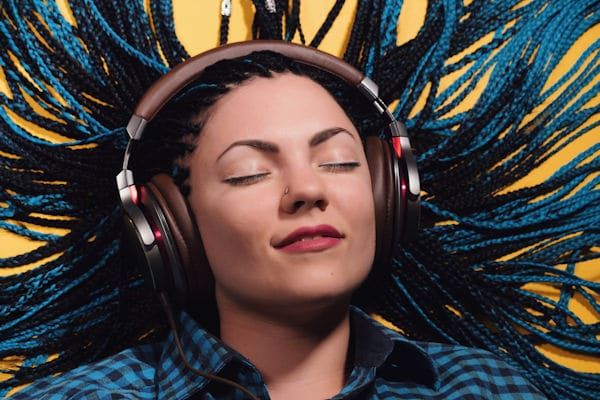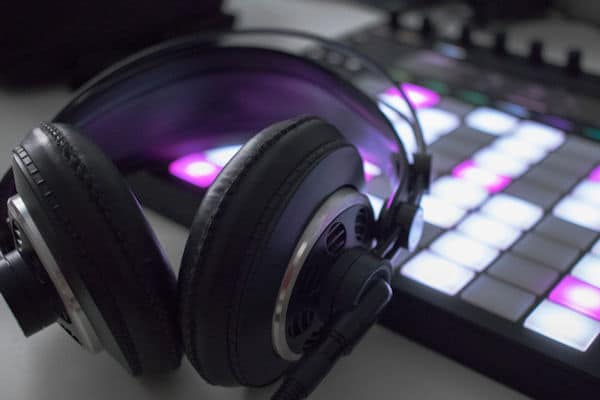Are Studio Headphones Good for Listening to Music?

From low-budget speakers and headphones to the high-end/high-definition ones, there is always something for everyone.
A great percentage of music consumers have always used headphones. It provides a more intimate and somewhat isolating listening experience when compared to loudspeakers.
Because of this, headphones have assumed a sort of “immovable position” in the music listening world. Loudspeakers sound quite exceptional, but headphones sound “differently” exceptional.
Also, sometimes listening to music with headphones becomes more than just a choice but also a sheer necessity. A typical example is listening to music in an environment where listening to music on loudspeakers will pose a sort of nuisance.
For headphone users, when shopping or trying to choose a suitable headphone, they often come across the term studio headphones.
As self-explanatory as the name might seem, many headphone users still get stuck with this question – “are studio headphones good for normal listening?”
Considering the fact that these special headphones are labeled “studio headphones,” it is not out of place to have this concern. Although the name insinuates that they are strictly for studio use, curiosity still keeps many wondering.
To answer that question, there are a few things you must know.
What are studio monitor headphones?

Regular headphones are designed to make music sound great. To achieve this, the technicians simply boost certain frequencies that sound appealing to the human ears.
On regular headphones, the bass and high frequencies are often boosted. This will give a little more [than normal] bass and a little more [than normal] shine. This will result in a somewhat exciting sound. After all, who doesn’t love a little more bass?
In other words, we can say that regular headphones color or flatter the sound you hear to a great extent. This makes music sound good, but not exactly “honest.”
Unlike regular headphones, studio headphones are designed to be as “flat” as possible. This flatness is very necessary for critical listening.
When you are mixing music or trying to judge a mix, you definitely do not want to hear the bass sounding a bit heavier than it actually is. You do not want to hear the vocal sounding a bit brighter and more exciting than it actually is.
If you do not hear things just the way they are, you will definitely make wrong and poorly guided mixing or critical decisions that will in turn affect the mix negatively.
Let’s assume your headphone is telling you that there is just enough bass when actually the bass is weak and because of this, you are not doing what you are supposed to do to the low-end. When the music is being played on another playback system, the truth will be known, regardless.
When mixing music, you need your headphones to be as flat (as honest) as possible to avoid making poor musical judgments.
This is the major difference between studio headphones and regular headphones. On studio headphones, the frequency response should be as flat as possible. There should be no “dips” and “boosts” in any part of the frequency.
Are studio headphones different from normal headphones?
From the above explanation, you can see that studio headphones are quite different from normal headphones. The major difference is that studio headphones are designed to sound flat while normal headphones are designed to make music sound good by boosting the high and low frequencies of any music.
Below are some other key features that differentiate these two types of headphones:
- The components used to make studio headphones are normally of higher quality when compared to that of normal headphones.
- Unlike normal headphones, studio headphones normally have better sound isolation – especially, closed-back studio headphones.
- Components used for studio headphones are carefully selected to match individual headphones, unlike consumer headphones that use a more generic approach when selecting components.
- Unlike normal headphones, studio headphones are generally more comfortable, because they are designed to be worn by professionals who are likely to use them for longer working hours.
- Studio headphones are generally more robustly built, and they last longer than the average normal headphone.
- Studio headphones have a wider frequency response when compared to normal headphones. It is this wide frequency response that enables you to hear things you normally would not hear on normal headphones.
Do you really need studio headphones for music production?
The simple answer is “yes, you do.” Because music production is quite different from normal music listening, you need at least a pair of studio headphones to really hear how things are sounding.
Music production requires critical listening. Even when you are not mixing or mastering music, you still need to hear exactly how a certain instrument sounds to make better musical decisions.
Let’s say you are going through a sound library searching for a certain kind of Lo-Fi piano and heavy 808, you cannot really make these choices if you are using a pair of “colored” headphones.
You might not know just how bright a certain digital piano or electric guitar is, or exactly how heavy a certain kick is because your headphones are lying to you.
When producing music, you need something as honest and flat as possible for reference. Using studio headphones for music production can be likened [to some extent] to creating music in an acoustically perfect listening environment.
This is because a good pair of studio headphones will take out the problem of acoustics from your listening experience. Studio headphones isolate you from your listening endorsement by creating a more intimate and better caustic listening environment.
Although some engineers will always frown against totally mixing with headphones, they still have quite an important role in music production.
This video gives more information on using studio headphones to produce music:
Can you use studio headphones for normal listening?
Generally, you can use studio headphones for normal listening. But this is solely a personal choice.
Before choosing a pair of studio headphones for normal music listening, you should first understand that they might not give you that flattering sound normal headphones are known for.
They might sound a little more flat and uncolored. To some untrained and “new ears,” this might be labeled “a bad sound.”
Know that this is how studio headphones were designed to sound. They were not made to flatter, but to speak the truth. This is the quality that makes them different from normal headphones.
news via inbox
Sign up for the latest music news and entertainment!






